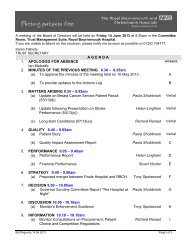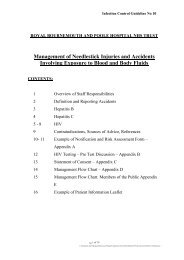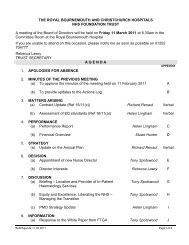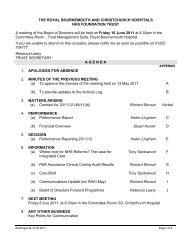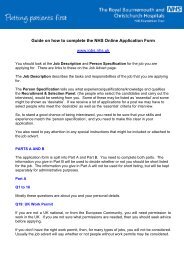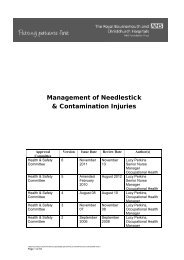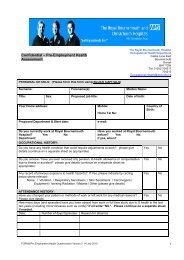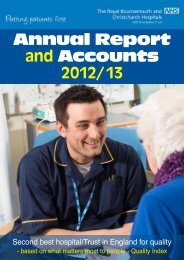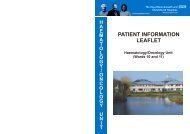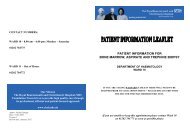Resuscitation Policy (DNAR) July 12 - Royal Bournemouth Hospital
Resuscitation Policy (DNAR) July 12 - Royal Bournemouth Hospital
Resuscitation Policy (DNAR) July 12 - Royal Bournemouth Hospital
- No tags were found...
Create successful ePaper yourself
Turn your PDF publications into a flip-book with our unique Google optimized e-Paper software.
1.0 IntroductionThis policy has been formulated by the <strong>Resuscitation</strong> Committee of the Trust and agreedby the Trust Management Board. This policy must be adhered to by the medical andnursing staff of the Trust. It has been written for adult patients and is based on the jointstatement from the British Medical Association, the <strong>Resuscitation</strong> Council (UK) and the<strong>Royal</strong> College of Nursing published in October 2007. In the case of patients under theage of 18 a refusal of a CPR (Cardio Pulmonary <strong>Resuscitation</strong>) attempt should be takeninto account, but could be overruled by a court or a person with parental responsibility.<strong>DNAR</strong> (Do Not Attempt <strong>Resuscitation</strong>) decisions apply only to CPR and not to any otheraspects of treatment.2.0 How the Decision is MadeRefer to the Decision-Making Framework (Appendix 1, <strong>DNAR</strong> policy)2.1 Patients for CPRAll patients admitted to the Trust will be for attempted resuscitation unless anactive decision is made to the contrary. Decisions about CPR must be made onthe basis of an individual assessment of each patient’s case. When a <strong>DNAR</strong>decision has not been made or there is uncertainty regarding <strong>DNAR</strong> status, thenresuscitation should be attempted. If appropriate, enquiry should be made at thetime of in-patient admission as to whether a valid and applicable advance decisionexists.It is not necessary to initiate discussion about CPR with a patient if there is noreason to believe the patient is likely to suffer a cardio-respiratory arrest. Theremay be situations in which CPR is commenced, but during attempted resuscitationfurther information comes to light that makes continued CPR inappropriate (forexample, a <strong>DNAR</strong> order, a valid and applicable advance decision, or importantclinical information). In such circumstances, continued attempted resuscitationwould not be appropriate.2.2 Patients not for CPRIf the clinical team believes that CPR would not restart the heart and breathing, itshould not be attempted. The patient’s individual circumstances and the most upto-dateguidance must be carefully considered before such a decision is made.The overall responsibility for a <strong>DNAR</strong> decision rests with the consultant in chargeof the patient’s care. In the absence of the consultant a senior member of theteam possessing the MRCP, MRCS or FRCA or its equivalent, may make a <strong>DNAR</strong>decision. Out of hours, in the absence of a senior doctor, the doctor on call mayundertake the decision in consultation with the consultant on call and nursing staff.In all cases where the consultant in charge has not been involved in the <strong>DNAR</strong>decision, then his/her agreement should be obtained at the earliest opportunity.The decision of <strong>DNAR</strong> status should not preclude undertaking other aspects ofcare.The <strong>Royal</strong> <strong>Bournemouth</strong> & Christchurch <strong>Hospital</strong>s NHS Foundation Trust<strong>Resuscitation</strong>/Do Not Attempt <strong>Resuscitation</strong> (<strong>DNAR</strong>) <strong>Policy</strong> (<strong>July</strong> 2008) Reviewed Jan 2011Author: <strong>Resuscitation</strong> Committee Page 4 of 11



